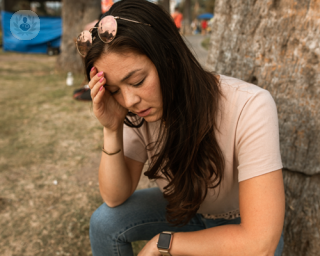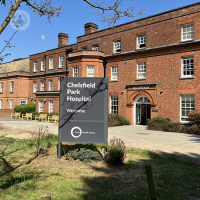Hypothyroidism
Dr Mark Vanderpump - Endocrinology, diabetes & metabolism
Created on: 11-13-2012
Updated on: 07-19-2023
Edited by: Karolyn Judge
What is hypothyroidism?
Hypothyroidism, otherwise known as underactive thyroid, is a condition affecting the thyroid gland, causing it to underproduce thyroid hormone. Thyroid hormone plays an important role in the body, affecting the metabolism. In those with hypothyroidism, the metabolic system runs more slowly, resulting in various problems.
Hypothyroidism most commonly affects women, affecting ten times more women than men. The condition can also occur in children.

What are the symptoms of hypothyroidism?
As hypothyroidism develops, symptoms may not be noticeable, as they are often a natural result of ageing. For example, weight gain and fatigue.
However, as the condition progresses, further signs and symptoms of hypothyroidism may develop, including:
- Dry skin
- Sensitivity to cold
- Thinning hair/brittle hair
- Pain in the joints
- Stiffness or swelling in the joints
- Irregular or heavy periods
- Weakness/aching in the muscles
- General fatigue
- Constipation
- Depression
What causes hypothyroidism?
The thyroid gland can fail to produce enough thyroid hormone for a number of reasons, including:
- Hashimoto’s thyroiditis, which is an autoimmune disorder in which the body attacks its own tissues.
- Hyperthyroidism treatment. In those who produce too much thyroid hormone, treatment seeks to reduce thyroid function. However, the treatment can cause permanent hypothyroidism.
- Radiation. Radiation therapy in cancer treatment of the head and neck can affect the thyroid gland and increase the risk of developing a thyroid disorder.
- Certain medication. Particular types of medication can cause hypothyroidism, such as lithium (often used in the treatment of psychiatric disorders).
How can it be prevented?
Anyone can develop hypothyroidism, and it cannot be prevented. However, there are certain risk factors, and being aware of the signs can help with a swift diagnosis.
Women over the age of 60 are more likely to develop hypothyroidism, along with women six months after having been pregnant or having had a baby. Family history of autoimmune disease or thyroid disease can also increase the chances of developing the condition. Those who have undergone radiation therapy in the upper chest or neck area are also at an increased risk, along with those who have undergone thyroid surgery to remove or partially remove the thyroid gland.

What is the treatment for hypothyroidism?
Treatment for hypothyroidism seeks to raise thyroid hormone levels. This is normally achieved through hormone replacement, which is generally taken lifelong. However, with hormone replacement, patients are able to live normal, and healthy lives.
It is important to make sure hypothyroidism is treated correctly. If the condition goes untreated, it can cause medical complications such as heart disease, and goitre (enlarged thyroid).
How is hypothyroidism diagnosed?
To find out about thyroid function, a blood test that measures your hormone levels is the most accurate way to discover if you have hypothyroidism. It looks levels of thyroid-stimulating hormone (TSH) and thyroixine (T4) in the blood.
It could mean you have an underactive thyroid if you have a high level of TSH and low level of T4 in the blood. If the blood test shows you have a raised level of TSH but normal T4, you may be at risk of developing an underactive thyroid in the future.
What's the difference between hypothyroidism and hyperthyroidism?
The main difference between hypothyroidism and hyperthyroidism is hormone levels. Hypothyroidism leads to a decrease in hormones while hyperthyroidism leads to an increase in hormone production.
With hyperthyroidism, patients may have more energy rather than less, experience weight loss instead of gain and feel anxious as opposed to depressed.
Hypothyroidism symptoms are the opposite; a slowed-down metabolism, tiredness and weight gain as well as decreased bodily functions.
Is hypothyroidism genetic?
Hypothyroidism can be genetic, occuring in different family members. When it's inherited, it's called congenital hypothyroidism.
All babies in the UK are tested for congential hypothyroidism around five days after birth. Around 3,500 newborn babies have the condition, and it's more common in girls than boys.

What is the prevalence of hypothyroidism?
In 2019, it was estimated that two per cent of people in the UK have an underactive thyroid.
Its incidence was found to be highest among postmenopausal women.
Which specialist treats hypothyroidism?
Endocrinologists, thryroidologists and some general practitioners diagnose and manage hypothyroidism.
















